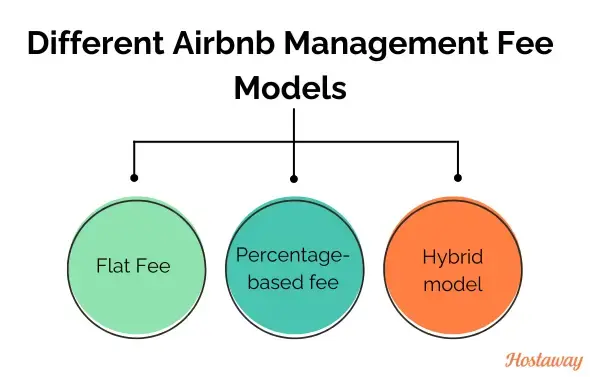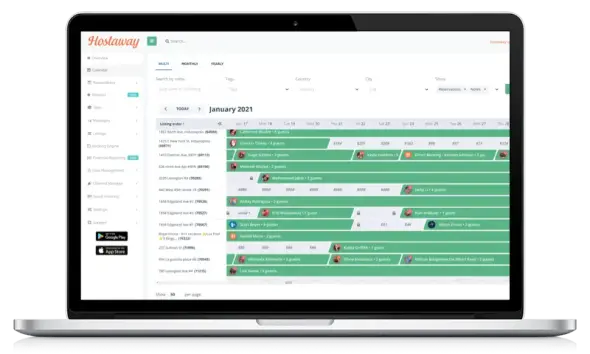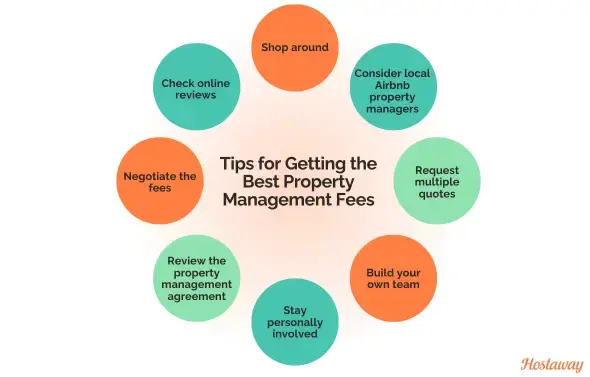Airbnb Management Fees: A Complete Breakdown
.webp?u=https%3A%2F%2Fimages.ctfassets.net%2Fpqmtoyw9z10u%2F3VO0vXrc2KlmPsEiAa7YVo%2F4922a7370ffeebf55cb386a84747e8a8%2FAirbnb_Management_Fees__1_.webp&a=w%3D960%26h%3D549%26fm%3Dwebp%26q%3D75&cd=2024-12-10T23%3A22%3A37.767Z)
Key Takeaways
Airbnb management fees cover the cost of running day-to-day operations like guest communication, cleaning and maintenance.
Fee structures vary — flat, percentage-based or hybrid — typically ranging from 10% to 40% of rental income depending on service level.
Costs are influenced by property size, location, scope of service and manager experience, with full-service options commanding higher rates.
Owners can reduce expenses by comparing quotes, negotiating or using automation tools like Hostaway for self-management.
Choosing the right balance between cost, convenience and control ensures better profitability and guest satisfaction.
Airbnb hosting is a fantastic way to generate extra income, but managing properties isn’t as simple as listing it online. One of the biggest challenges vacation rental owners face is navigating property management costs, which can make or break your vacation rental’s profitability.
Whether you’re just starting out or already have hosting experience, understanding the different Airbnb management fees is key to boosting your short-term rental income while keeping your stress levels in check.
This guide breaks it all down — what these fees cover, how they’re structured and what to look for — so you can make smarter decisions and get the most out of your Airbnb business.

Model | How it Works | Pros | Cons | Best for |
Flat Fee | Fixed monthly fee (e.g., $500), regardless of income | - Predictable cost - Easy to budget | - Doesn’t adjust for performance - May be costly if income is low | Properties with steady, predictable revenue |
Percentage-based | Manager takes a share of monthly rental income (usually 10%–25%) | - Incentives aligned with performance - Lower risk if income drops | - Costs rise when revenue increases - Less predictable month-to-month | Hosts who want managers motivated to maximize bookings |
Hybrid | Base fee + percentage of income (e.g., $300 + 10%) | - Balance of predictability & performance-based pay - Shares risks and rewards | - More complex structure - Still variable | Hosts seeking a middle ground between fixed cost and performance-based model |
Understanding Airbnb Management Fees
Vacation rental management fees are charges paid to property management companies or individuals for overseeing the day-to-day operations of a vacation rental property.
These fees cover tasks such as managing bookings, communicating with guests, handling maintenance and ensuring the vacation rental property is clean and ready for every stay.
By outsourcing these responsibilities to property management services, hosts save time and effort, allowing them to focus on other priorities.
The scope of services included in these fees varies. Some property managers offer basic services like handling guest inquiries and coordination, and booking optimization, while others provide comprehensive solutions that include restocking supplies, regular property inspections and even furnishing the vacation rental.
These different service levels are reflected in the fee structure, which we’ll explore next.
Types of Airbnb Management Fee Structures

When it comes to how property managers charge, there are three main models. Each has its pros and cons, so it’s all about finding what works for your vacation rental and your budget.
Flat fee
The flat fee model is straightforward — hosts pay a fixed amount each month regardless of the property’s income. This structure offers predictability, making it easier to budget.
For instance, a flat fee of $500 per month would remain constant whether the property earns $3,000 or $6,000.
This option works best for vacation rental properties with consistent performance or hosts who prefer knowing their costs upfront.
Percentage-based fee
The percentage-based model is one of the most popular options among Airbnb hosts.
In this structure, the short-term rental property management company charges a percentage of the vacation rental property’s rental revenue, usually between 10% and 25%.
This approach aligns the vacation rental manager’s incentives with the property’s success, as their earnings depend on the property’s performance.
For example, if a property earns $5,000 in a month and the rental management fee is 20%, the property manager receives $1,000.
Hybrid model
The hybrid structure combines elements of both flat and percentage-based fees. For example, a manager might charge a base fee of $300 plus 10% of monthly revenue.
This model strikes a balance, allowing hosts to benefit from both predictability and performance-based rewards.
It’s an excellent choice for hosts who want to share both risks and rewards with their property manager.
What Affects Airbnb Management Fees?
.webp?u=https%3A%2F%2Fimages.ctfassets.net%2Fpqmtoyw9z10u%2F1kA1nlIBNVT4V92y5k8hXm%2F4e2ff94609d760d2135e5047251354b9%2FFactors_that_Affects_Airbnb_Management_Fees__1_.webp&a=w%3D590%26h%3D337%26fm%3Dwebp%26q%3D75&cd=2024-12-10T23%3A10%3A59.010Z)
Location
The location of your property plays a significant role in determining property management costs. In high-demand tourist destinations, competition among property managers often results in increased charges.
On the other hand, properties in quieter or less popular areas might incur lower charges.
Property type and size
The type and size of your short-term rental property also impact rental management fees. Larger homes or villas often require more cleaning, maintenance and attention to detail, which drives up costs.
Similarly, older properties might need frequent repairs, adding to the expense.
Scope of service
The range of services you require will directly affect the fees.
Basic services like managing guest inquiries and booking coordination are less expensive, while comprehensive packages that include regular inspections, furnishing and legal compliance come at a premium.
Reputation and Expertise
Experienced property managers with a strong track record often charge higher fees.
However, their expertise can lead to higher occupancy rates, better reviews and ultimately more income for the host/property owners.
Vacancy rate
The amount of time your vacation rental spends vacant can affect fees as well. High vacancy rates may lead some property managers to charge a minimum fee to cover their efforts.
Conversely, vacation rental properties with consistently high occupancy may enjoy lower fees because they generate more income for the property manager.
Market dynamics
Local market conditions can also play a role. In competitive markets with lots of vacation rentals, property managers may charge higher fees to reflect demand.
Alternatively, in slower markets, fees might be lower to attract property owners.
Airbnb Management Fees Based on Scope of Service
When it comes to Airbnb management services range from half-service to full-service and the fees you'll pay depend significantly on the level of assistance you choose.
Half-service management
Management fees for basic management solutions typically range from 10% to 15% of your monthly short-term rental (STR) income.
This option includes essential services such as listing optimization, advertising, booking management, revenue strategy, handling guest inquiries, tax collection and property damage protection.
Full-service management
Opting for comprehensive management means more extensive support, which is reflected in elevated costs — ranging from 15% to 40%. This increase is due to additional services provided beyond those included in the half-service plan.
It also covers restocking supplies, furnishing the home, conducting regular inspections, cleaning, repairs, ongoing maintenance and ensuring legal compliance.
Miscellaneous Costs and Fees in Airbnb Management
Airbnb managers often have additional costs and fees that vary based on the specific needs of a short-term rental (STR) business. These include:
Set-up fees: Some property managers charge a one-time onboarding fee for initial listing optimization.
Cleaning service fee: Depending on the property size, Airbnb managers typically charge a cleaning fee between $50 and $100 (usually paid by the guests).
Pet fees: Extra charges may apply for properties that allow pets, covering additional cleaning or potential damages caused by animals.
Maintenance costs: Extra charges may apply for unexpected issues during stays, covering prompt repairs, regular inspections, pest control and general maintenance.
Value-added services cost: Extra charges apply for additional perks offered by management companies such as exclusive tours or vacation home furnishing.
Supplies restocking fees: Managers may impose monthly fees for restocking essential supplies like kitchen items, linens and toiletries between stays.
Vacation rental insurance fee: Additional fees are incurred for insurance coverage that includes damage protection, bed bugs, fleas, burglary, Airbnb squatters and liability.
Early termination fee: Terminating a management contract ahead of schedule can result in hefty fees from some property managers.
How to Calculate Airbnb Management Fees
Understanding the financial implications of monthly management fees is critical for planning and profitability. Here’s a simple method to calculate these costs.
.webp?u=https%3A%2F%2Fimages.ctfassets.net%2Fpqmtoyw9z10u%2F3zvafu8ki0Z6jXeqsViTqx%2Fb6bfeef26884f6a253abc9ad74310d93%2FCalculate_Airbnb_Management_Fees__1_.webp&a=w%3D590%26h%3D337%26fm%3Dwebp%26q%3D75&cd=2024-12-10T23%3A13%3A24.592Z)
Example scenario
Imagine a beachfront villa generates $5,000 in monthly rental income. The vacation rental management fee is 20%, the Airbnb platform fee is 3% and there are additional costs of $300 for restocking supplies and $100 for cleaning.
Step 1: Calculate net revenue
The formula is:
Net Revenue = Total Revenue × (1−(Property Management Fee + Platform Fee))
For this example:
Net Revenue = 5000 × (1 − (0.20 + 0.03)) = 5000 × 0.77 = 3850
Step 2: Deduct miscellaneous costs
Next, subtract additional costs from the net revenue:
Final Income = Net Revenue − (Restocking Fee + Cleaning Fee)
For this example:
Final Income = 3850 − (300 + 100) = 3450
The host’s final income after fees is $3,450.
Using Airbnb Management Software
Often paying someone to manage your property can really eat into your bottom line. Especially, if it's a commission-based pay.
That’s why so many hosts are now choosing to self-manage using property management software or vacation rental software like Hostaway.
Hostaway is a game-changer. It’s designed to make managing multiple listings simple and stress-free. Here's how this Airbnb management software helps:

Automation at your fingertips
Hostaway uses automation to streamline many routine tasks. From sending booking confirmations and reminders to scheduling cleanings after check-out, these processes can run in the background without needing your constant attention.
This not only saves time but also reduces the chance of human error.
AI-driven insights
Leveraging AI, Hostaway provides advanced analytics and insights into your vacation rental performance.
This can include pricing recommendations based on market data and trends, which help you optimize your rates for maximum profitability.
AI also enhances guest interactions by offering quick, contextual responses to common inquiries, ensuring your guests are attended to promptly.
Mobile app
With Hostaway's mobile app you can manage your properties on the fly. Whether you're at the beach or on a business trip, you can access all the critical aspects of your Airbnb business right from your smartphone.
Update listings, adjust pricing, communicate with guests and see new bookings — all from the app.
Must-have features
Centralized dashboard: All your listings and bookings are managed from one dashboard, providing a comprehensive overview of your vacation rental business.
Multi-channel synchronization: Keep your listings updated across all platforms to avoid double bookings and maximize exposure.
Automated messaging: Set up custom automated messages that engage guests at every stage of their stay, from check-in to check-out.
Dynamic pricing tools: Use AI-powered tools to dynamically adjust pricing, ensuring you always offer competitive rates.
Unified inbox: Streamline communications with a unified inbox that collects messages from all platforms in one place, making it easier to keep track of guest interactions.
8 Tips for Securing the Best Price on Property Management Fees

1. Shop around
Don’t settle for the first property manager you come across. Vacation rental management fees typically range from 10% to 40%, so it’s worth talking to at least 4–5 different property management companies to see what they offer.
Nationwide vacation rental management companies might have strong reputations, but local property managers often provide better value and personalized service. Compare their average property management fees, services and expertise to find the best fit.
2. Consider local Airbnb property managers
Large-scale, nationwide vacation rental management companies may seem like the obvious choice, but smaller, local property managers can often provide better rates. Without the overhead costs of big corporations, they can pass the savings on to you.
However, be cautious with very small teams — ensure they have sufficient coverage to handle emergencies or busy seasons.
3. Request multiple quotes
Ask for quotes from several property management companies, both big and small. Be transparent about your interest in working with them, but also make it clear you’re comparing offers.
This approach shows property managers you’re serious and could prompt them to offer more competitive rates or additional perks to win your vacation rental business.
4. Build your own team
If you’ve been self-managing your short-term rental and have trusted local contacts, such as cleaners and maintenance workers, leverage those relationships.
By introducing your own team, you can opt for basic management. This significantly reduces costs while ensuring you still have professional oversight where needed.
5. Stay personally involved
Take on some of the responsibilities for managing your short-term rental if you live nearby or have the time. Tasks like guest interactions or supply restocking can save you a lot on vacation rental management fees.
Plus, being involved gives you greater control over your short-term rental and ensures it’s being managed to your standards.
6. Review the property management agreement
Always read the fine print.
Before signing anything, review the property management contract to understand exactly what services are included, your responsibilities and the typical fees you’ll need to pay.
This step helps you avoid hidden charges and ensures you’re getting what you expect.
7. Negotiate the fees
While larger management companies may have rigid pricing structures, many are open to negotiation, especially if you show them competitive quotes from other property managers.
Highlight your interest in their services but be clear about your budget. They may be willing to adjust their rates to win your business rather than lose you to a competitor.
8. Check online reviews
Before committing to any property manager or vacation rental management company, research their reputation.
Online reviews from other hosts often reveal valuable insights, such as unexpected fees or poor service, that might not be apparent from initial conversations. Use this feedback to make an informed decision.
Are Airbnb Management Fees Worth It?
Whether property management fees are worth it depends on your goals and availability.
For many hosts/vacation rental owners, the convenience of having someone handle guest interactions, bookings and maintenance is worth the cost, especially if they manage multiple properties or live far away. It can save time and reduce stress.
However, if you’re hands-on and have the time, self-management can help you keep more of your earnings. Tools like Hostaway make it easier to automate tasks and avoid the high costs of a property manager.
Ultimately, it’s a trade-off between saving time and maximizing profits. If you value a passive income stream, vacation rental management fees are often worth it.
But if keeping more of your revenue is your goal, managing the property yourself might be a better choice.
Making the Right Call
As you dive into or continue your Airbnb hosting journey, getting a good grip on rental management fees is key. These fees can have a big impact on how you run your rental, especially when it comes to budgeting and balancing your workload.
Whether you’re considering a comprehensive management solution that handles everything from housekeeping to guest communication or a more streamlined, hands-on approach, each option has its own pros and cons.
Using tools like Hostaway can take a lot off your plate. They’re especially handy if you’re juggling multiple properties, as they help automate and centralize tasks.
In the end, taking the time to evaluate different management fee structures will help you keep more of your rental income while still delivering a great guest experience.
FAQs
1. What are Airbnb property management fees?
Property management fees are charges paid to vacation rental managers for handling tasks like guest interactions, bookings, cleaning, maintenance and more.
These vacation rental management fees vary based on the scope of services provided and the fee structure chosen.
2. How are Airbnb management fees calculated?
Vacation rental property management fees are typically calculated as a percentage of your property’s rental income (e.g., 10%-25%), a flat monthly fee or a hybrid of both.
Additional costs for cleaning, restocking supplies and repairs may also apply.
3. What’s the difference between full-service and half-service management?
Basic management covers essentials like booking management, guest communication and listing optimization. Fees range from 10%-15% of your fixed monthly income.
Full-service management includes additional services like cleaning, maintenance and legal compliance, with fees ranging from 15%-40%.
4. Are Airbnb management fees negotiable?
Yes, some vacation rental management companies are open to negotiation. Hosts can often customize services to fit their needs, potentially reducing costs.
5. What’s the benefit of using software like Hostaway instead of a manager?
Hostaway and similar software let you automate tasks like booking confirmations, guest messaging and dynamic pricing. It’s a cost-effective option for hosts who want to self-manage without sacrificing efficiency.
Ready to find out how Hostaway can transform your business?
